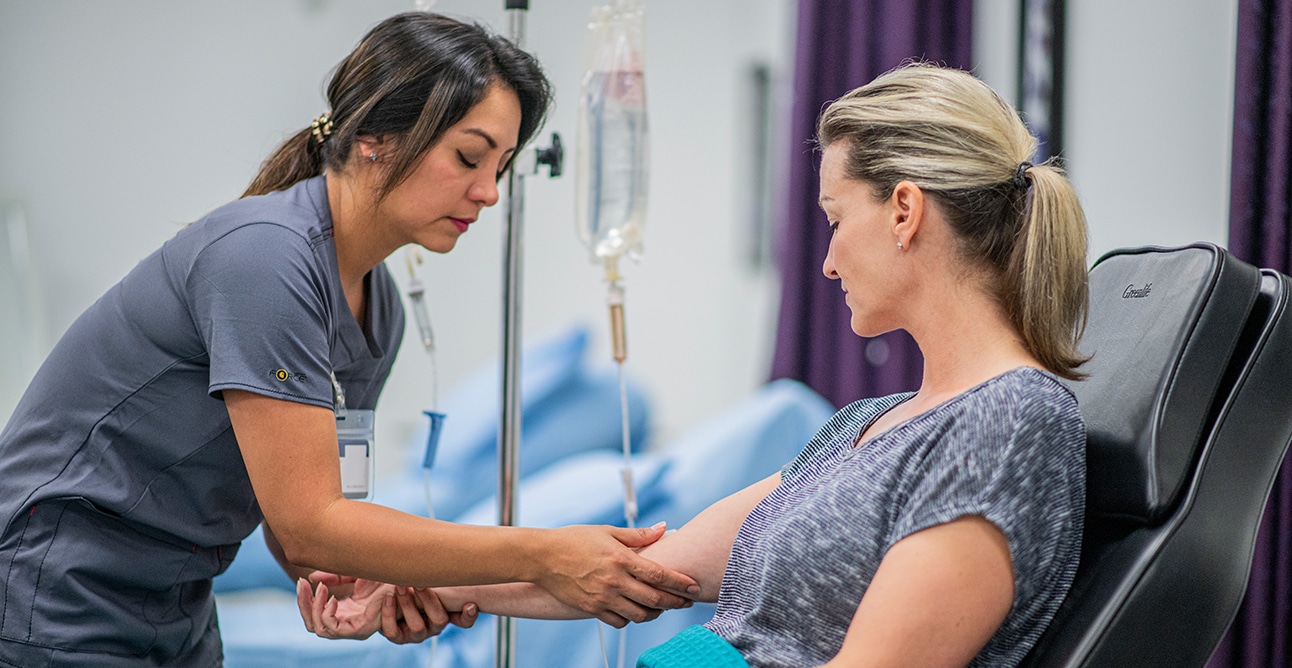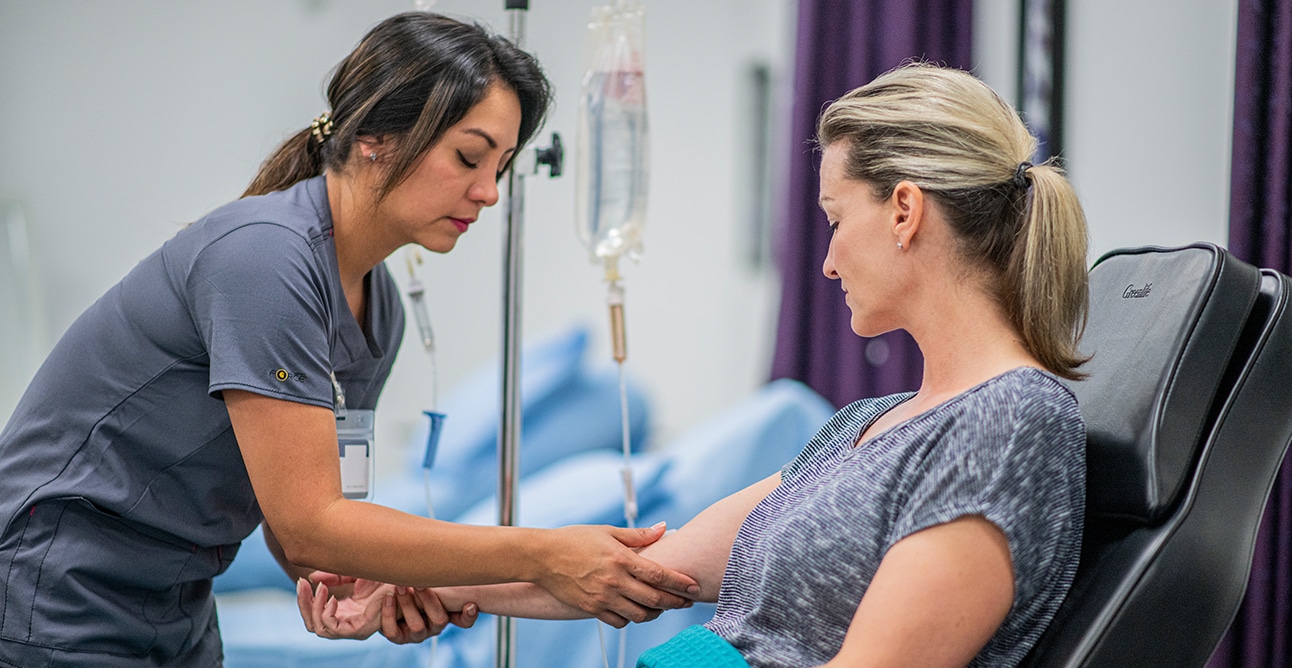Discover the gift of life renewed through organ transplantation.
Organ transplant is a life-changing, or perhaps a life-saving, option for many patients with organ failure. Statistics tell us that one person can donate eight life-saving organs, as well as tissue and corneas that can drastically improve the lives of another 75 people.
At ECU Health, patients with end-stage kidney failure or diabetes can benefit from a kidney, pancreas or simultaneous kidney/pancreas transplant without leaving eastern North Carolina. An average of 120 to 140 living and deceased donor transplants are performed at ECU Health Medical Center every year, with some of the shortest wait times (for recipients) across the state.
ECU Health’s team will work with you and your doctors to determine if a transplant is right for you. We will meet with you and your family to review the evaluation process, the transplant procedure, and your post-transplant care. We will support you in making the best decision for you and your family.
If you are interested in registering as an organ donor through ECU Health, please visit our donor registration portal.
Transplant Expertise
Why ECU Health Transplant?
For nearly four decades, transplant teams at ECU Health Medical Center and East Carolina University have given patients a new chance at life through organ transplantation.
On a single day, you will attend educational sessions, meet with the transplant team, and learn what testing is needed to determine if transplant is right for you. We work with your doctors to keep you healthy and ready for transplant while you are waiting.
Patients with kidney failure and/or diabetes require specialized care. Our transplant surgeons are fellowship-trained to address all of your needs, including access for dialysis, hernia repair, treatment of hyperparathyroidism, and other types of minimally invasive and robotic surgery.
Our team of nurses, doctors, social workers and pharmacists live and work right here in eastern North Carolina. We strive to understand you and your needs and to ensure the best possible experience for you and your family.
Your Transplant Team

Your care team at ECU Health Medical Center in Greenville will work with you during all phases of your transplant journey. Your multidisciplinary team includes:
Transplant Surgeons
Physicians who specialize in organ transplantation and perform the surgery.
Nephrologist
A physician specializing in care and management of kidney disorders. Your nephrologist will provide care before and after your surgery.
Transplant Nurse Coordinator
A registered nurse who facilitates and organizes all aspects of your care before and after surgery and provides education and coordination of diagnostic testing and follow-up care.
Social Workers
Professionals who help your family deal with related matters including lodging and transportation, finances and legal issues.
Dietitians
Professionals who will help you meet nutritional needs before and after the transplant.
Physical Therapists
Professionals who will help you become strong and independent with movement and endurance after surgery.
Pastoral Care
Chaplains who provide spiritual care and support.
Others
Several additional team members will evaluate you before the transplant and make recommendations to the team, including but not limited to anesthesiologists, hematologists, infectious disease specialists, psychologists and cardiologists.
Your Transplant Team
Physicians who wish to refer a patient to ECU Health Transplant for evaluation can complete this form and fax it to 252-847-3337.

General Transplant FAQs
UNOS is responsible for transplant organ distribution in the United States.
UNOS oversees the allocation of many different types of transplants, including kidney, liver, pancreas, heart, lung, cornea, bone, and skin.
UNOS receives data from hospitals and medical centers throughout the country regarding adults and children who need organ transplants. The medical transplant team that currently follows you is responsible for sending your data to UNOS, and updating them as your condition changes.
As of December 4, 2014, the newly revised kidney allocation system (KAS) has been in place. This new system was designed to improve transplant opportunities for all candidates giving better access to patients who often wait longer due to blood type or other reasons. If you were already on a waiting list before the implementation of the new KAS you will not lose your place in line. Talk to your health care provider about the new KAS guidelines.
When a donor organ becomes available, a computer searches all the people on the waiting list for a kidney and sets aside those who are not good matches for the available kidney. A new list is made from the remaining candidates. The person at the top of the specialized list is considered for the transplant. If he or she is not a good candidate, for whatever reason, the next person is considered, and so forth. Some reasons that people lower on the list might be considered before a person at the top include the size of the donor organ and the geographic distance between the donor and the recipient.
Most kidneys that are transplanted come from deceased organ donors. Organ donors are adults who have become critically ill and are pronounced dead because their brain or heart has stopped working permanently. Kidneys are harvested after these adults are pronounced dead. The family of the deceased person needs to agree to donate the person’s organs. Donors can come from any part of the United States. This type of transplant is called a deceased donor transplant.
A person receiving a transplant usually receives only one kidney, but, in rare situations, he or she may receive two. Some experimentation with splitting one kidney for two recipients is underway. Family members or individuals who are unrelated, but make a good match, may also be able to donate one of their kidneys. This type of transplant is called a living transplant (living donor). People who donate a kidney can live healthy lives with the kidney that remains. A child older than 2 years can generally receive an adult kidney, as there is usually enough space in the belly for the new kidney to fit.
According to the latest statistics from the Organ Procurement and Transplantation Network, there were 16,813 kidney transplants performed in 2011. Of that total, 11,043 were from deceased donors and 5,770 were from living donors.
Rejection is a normal reaction of the body to foreign tissue. When a new kidney is placed in a person’s body, the body sees the transplanted organ as a threat and tries to attack it. The immune system makes antibodies to try to kill the new organ, not realizing that the transplanted kidney is beneficial. To allow the organ to successfully live in a new body, medications must be given to trick the immune system into accepting the transplant and not thinking it is a foreign object.
This risk of infection is especially great in the first few months because higher doses of antirejection medications are given during this time. You will most likely need to take medications to prevent other infections from occurring.
The following are some of the most common symptoms of rejection:
- Fever
- Tenderness over the kidney
- Elevated blood creatinine level
- High blood pressure
Your transplant team will instruct you on who to call right away if any of these symptoms occur.
Medicines must be given for the rest of your life to fight rejection. Each person is individual, and each transplant team has preferences for different medicines. The antirejection medicines most commonly used singly or in combination include:
- Envarsus XR
- Tacrolimus
- Mycophenolate mofetil
- Prednisone
New antirejection medicines are continually being approved. Healthcare providers tailor medicine regimes to meet the needs of each individual.
Usually several antirejection medicines are given initially. The doses of these medicines may change often as your response to them changes. Because antirejection medicines affect the immune system, persons who receive a transplant will be at higher risk for infections or even certain types of cancer. A balance must be maintained between preventing rejection and making you very susceptible to infection. Blood tests to measure the amount of medicine in the body are done periodically to make sure you do not get too much or too little of the medicines. White blood cells are also an important indicator of how much medicine you need.
This risk of infection is especially great in the first few months because higher doses of antirejection medicines are given during this time. You will most likely need to take medicines to prevent other infections from happening.

Browse our health library for all of your kidney or pancreas transplant research needs.
